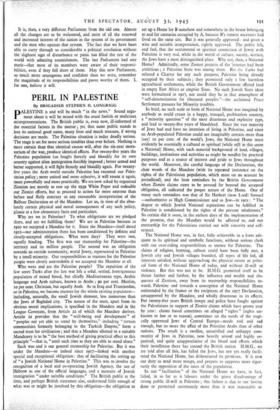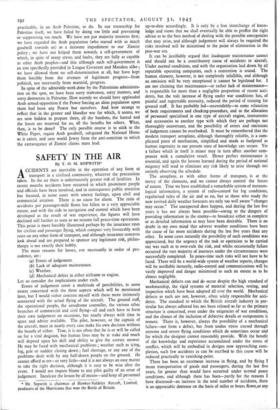PERIL IN PALESTINE
By BRIGADIER STEPHEN H. LONGRIGG
PALESTINE is and will be much " in the news." Sound argu- ment about it will be mixed with the usual foolish or malicious misrepresentations. The British public is, even now, ill-informed of the essential factors in the matter ; yet that same public stands to lose its national good name, many lives and much treasure, if wrong decisions are made: The Palestine situation is today deadly serious. The stage is set for more serious troubles than ever before. Nothing is more certain than that identical causes will, after the six-year mora- torium of the war, produce identical effects. For twenty-five years the Palestine population has fought fiercely and bloodily for its own country against alien immigration forcibly imposed ; better armed and better supported, it will fight fiercely and bloodily again. For twenty- five years the Arab world outside Palestine has resented our Pales- tinian policy ; more united and more cohesive, it will resent it again, more powerfully and more practically. We are now asked by organised Zionism not merely to tear up the 1939 White Paper and redouble our Zionist efforts, but to proceed to action far more extreme than before and flatly contrary to any reasonable interpretation of the Balfour Declaration or of the Mandate. Let us, in view of the abso- lutely certain physical and moral consequences of any such policy, glance at a few elementary facts and particulars.
Why are we in Palestine? To what obligations are we pledged there, and are we fulfilling them? We are in Palestine because in 5920 we accepted a Mandate for it. Since the Mandate—itself dated 1922—our administration there has been conditioned by definite and clearly-accepted obligations. What were they? They were two, equally binding. The first was our trusteeship for Palestine—the territory and its million people. The second was an obligation towards an outside community, world Jewry, represented in Palestine by a Small minority. Our responsibilities as trustees for the Palestine people were clearly unavoidable if we accepted the Mandate at all.
Who were and are the Palestine people? The expulsion of the few score Turks after the last war left a solid, settled, homogeneous population of mixed blood, but chiefly Mediterranean type, Arabic language and Arab culture, known as Arabs ; 90 per cent. Muslim, to per cent. Christian, but equally Arab. As in Iraq and Transjordan, so in Palestine, we became trustees for the whole existing population— including, naturally, the small Jewish element, less numerous than the Jews of Baghdad city. The nature of the trust, apart from its obvious moral implications, is specified in the Mandate and in the League Covenant, from Article 22 of which the Mandate derives. Article 22 provides that the " well-being and development " of " peoples not yet able to stand by themselves," including " certain communities formerly belonging to the Turkish Empire," form a sacred trust for civilisation ; and that a Mandate allotted to a suitable Mandatory is to be " the best method of giving practical effect to this principle "—that is, " until such time as they are able to stand alone."
Such was and is our general trusteeship for Palestine. But it was under the Mandate—or indeed since 1917—linked with another special and exceptional obligation: that of facilitating the setting up of "a Jewish National Home in Palestine." This was to involve the recognition of a local and co-operating Jewish Agency, the use of Hebrew as one of the official languages, and a measure of Jewish immigration "under suitable conditions." The British public at the time, and perhaps British statesmen also, understood little enough of what was or might be involved by this obligation—the obligation to
set up a Home for B somehow and somewhere in the house belonging to and for centuries occupied by A, because B's remote ancestors had lived on the same site. But it was generally approved: and given a wise and suitable interpretation, rightly approved. The public felt, and feel, that the sentimental or spiritual connection of Jewry with Palestine is very real, while in the world of culture, society, science, the Jews have a most distinguished place. Why not, then, a National Home? Admittedly, some Zionist projects of the 'nineties had been ambitious ; a Palestine State was among them. But the lurks had refused a Charter for any such purpose, Palestine being already occupied by their subjects ; they permitted only a few harmless agricultural settlements, while the British Government offered land in empty East Africa or emptier Sinai. No such Jewish State ideas were formulated in 1917, nor could they be in that atmosphere of " self-determination for liberated peoples "—the acclaimed Peace Settlement panacea for Minority troubles.
In brief, no such scale or form of National Home was imagined by anybody as could create in a happy, tranquil, problemless country, a " minority question " of the most disastrous and explosive type, and lead to twenty-five years of bloodshed. Since the vast majority of Jews had and have no intention of living in Palestine, and since an Arab-populated Palestine could not imaginably contain more than (say) ro per cent. of the world's Jews, the National Home must evidently be essentially a cultural or spiritual (while still in this sense a National) Home, with such material background of land, villages, buildings, institutions and activities as might be needful for practical purposes and as a source of interest and pride to Jews throughout the world. Moreover, the careful language of the Declaration, the dear words of the Mandate (with its repeated insistence on the rights of the Palestinian population, which must on no account be prejudiced), and the later reminders by the British Government when Zionist claims came to be pressed far beyond the accepted obligation, all indicated the proper nature of the Home. One of many such reminders was that of Sir Herbert (now Lord) Samuel —authoritative as High Commissioner and as Jew—in 1921: "The degree to which Jewish National aspirations can be fulfilled in Palestine is conditioned by the rights of the present inhabitants." So certain did it seem, in the earliest days of the implementation of the promise, that the Mandate would be adhered to, and our trusteeship for the Palestinians carried out with sincerity and self- respect.
The National Home was, in fact, fully achievable in a form ade- quate to its spiritual and symbolic functions, without serious clash with our over-riding responsibilities as trustee for Palestine. The claims of religion, learning, culture could have been fully met, a Jewish city and Jewish villages founded, all types of life led, all interests satisfied, without approaching the physical extent or politi- cal form of the National Home of today, and without or violence. But this was not to be. H.M.G. permitted itself to be thrust farther and farther, by the influence and wealth and elo- quence of Zionism, away from its trusteeship responsibilities to- wards Palestine and towards a conception of the National Home unintended by the framer or the recipients of the 5957 Declaration, unsupported by the Mandate, and wholly disastrous in its effects. For twenty-five years British troops and police have fought against the Palestinians in support of Zionist claims which have grown year by year: claims based sometimes on alleged " rights " (rights un- known to law or to reason), sometimes on the needs of the tragi- cally oppressed Jews of Central Europe—needs real and sad enough, but no more the affair of the Palestine Arabs than of other nations. The result is a swollen, unsatisfied and unhappy com- munity of Jews in Palestine, now heavily armed and highly or- ganised, and quite unappreciative of the blood and efforts which
their installation there has caused the British nation. H.M.G., we are told after all this, has failed the Jews, has not yet really facili- tated the National Home, has dishonoured its promises. It is now our duty to send more troops, and prepare to suppress more rigor- ously the opposition of the mass of the population.
In our " facilitation " of the National Home we have, in fact, failed, in so far as it labours under ' the grave disadvantage of strong public in Palestine ; this failure is due to our having
done or permitted enormously more than it was reasonable or
practicable, in an Arab Palestine, to do. In our trusteeship for Palestine itself, we have failed by doing too little and preventing or suppressing too much. We have not put majority interests first; we have regarded the Arab population (who started with so much goodwill towards us) as a tiresome impediment to our Zionist policy ; we have not helped them towards a self-government of which, in spite of many errors and faults, they are fully as capable as other Arab peoples—and this although such self-government is an aim specifically provided in League Covenant and Mandate alike ; we have allowed them no self-determination at all, but have kept them forcibly from the avenues of legitimate progress—from political, not necessarily from material, progress.
In spite of the admirable work done by the Palestinian administra- tion on the spot, we have been sorry statesmen, sorry trustees, and sorry democrats in Palestine. How warmly we should have applauded Arab armed opposition if the Power forcing an alien population upon them had been any Power but ourselves. And how strange to reflect that in the greater and bloodier war for which, it seems, we are now bidden to prepare there, all the burdens, the hatred and the losses are reserved for us, all the benefits for others. What, then, is to be done? The only possible course is to stick to the White Paper, regain Arab goodwill, safeguard the National Home as it exists, and save world Jewry from the anti-semitism to which the extravagance of Zionist claims must lead.



























 Previous page
Previous page